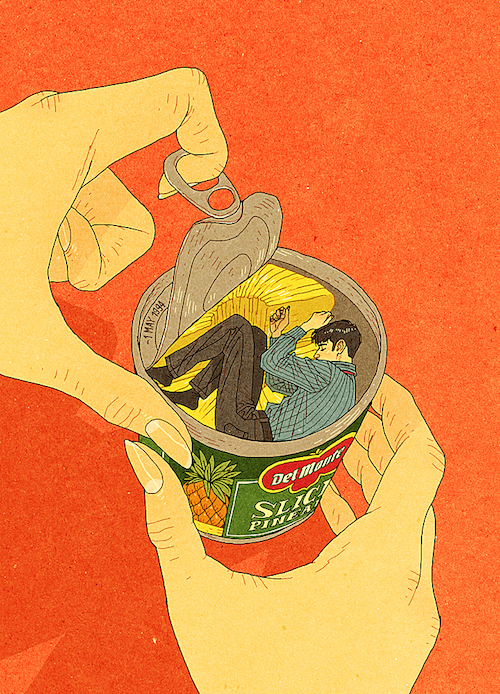
The first time I got my heart broken, I moved across the country to California without a job, a home or anyone I knew beyond my roommates. “There’s nothing left for me here,” I would repeatedly say to friends in the feeble hope that the girl in question would suddenly appear out of the shadows to ask me to stay. The pain was so dramatic it felt like a physical distance between her and me was not enough. I needed some kind of temporal distance that would always keep us three hours apart and hundreds of dollars from ever seeing each other.
The next time I got my heart broken, I moped around my neighborhood most weekends, wandering the streets while Get Lonely played on a loop in my shitty headphones. I let my meager mustache grow out and just labeled parts of the city I explored with her off limits. I later turned her into a cartoon cat.
The last time I got my heart broken, I spent way too much time working on the mixtape above. I remember leaving her apartment, struck by how well I seemed to be taking it.
“Well this certainly is progress,” I thought as I hailed a cab outside her building.
It would be a couple weeks until the grief really set in and I started obsessing over the mixtape. The final product isn’t exactly a retelling or necessarily even entirely related to that heartbreak, but it feels inextricably tied to that moment and the associated realization that I had effectively hidden my heartache from strangers and friends.
Which more or less is what I think the mixtape is actually about. Heartbreak isn’t something where what was once whole is simply rent in two, but it’s more of how do you survive without the person you look forward to seeing the most.
The heart is covered in fractures and bruises with scar tissue and callouses slowly enveloping the once raw, fresh tissue. But those areas don’t necessarily mean the pain is numbed, as much as it means the pain is easier to handle. The pain that once required a cross country move, could be handled through a steady regiment of The Smiths, a couple sad Mark Kozelek songs, and a few plays of Jens Lekman’s I Know What Love Isn’t.
“You don’t get over a broken heart; you just learn to carry it gracefully.”
More or less it becomes like therapy. Therapy can’t fully remove the pains of life or change the circumstances in which that pain exists. What therapy does is it enables you to better understand that pain and figure out how to keep going even in the face of grief. Coping skills are less about numbing and more about learning how to live with the pain that can feel inescapable.
For the last ten years I’ve been making a mixtape for every Valentine’s Day. While the early ones are completely lost to the age of a very slow Hewlett-Packard desktop and discarded CD-Rs, I’ve put all the ones I still have up on this site. But now as the project is a decade old, looking back I’ve pretty much refined my own breakup mixtape with some novelty ideas scattered in between. Juxtaposing songs about being in love right against songs about losing it feels the way it feels to have that heart ruptured, but just like a good coping mechanism I’ve started to settle into a routine.
Which is why I’ve decided to make this mixtape my last Valentine’s Day mixtape. The project, while initially fun and constantly pushing me to find an angle on songs about love like songs about loving someone who is funny, the impossibility of meeting someone at a bar, or the age old process of asian fetishization, has become stale. Even on this mixtape, only four artists on Side A have never appeared on a mix before.
Initially I started it as a simple idea of collecting covers of songs about love, but as time evolved, it felt unfair to ignore the originals. So what you’ll probably notice above is that Side A is an hour (plus a few minutes just because any experienced mixtape maker knows you can always squeeze in a bonus song on a cassette) of covers while Side B is an hour of those songs in their original form, but in reverse order, as if it was playing through a filtering cassette player.
It should also be noted that the male and female singers both represent different voices in the story. Side A serves as more of the guy’s story whereas Side B is more of the girl’s.
I briefly considered how “cute” it would be if I instead decided to completely cut out any form of digital distribution and only give it out as cassettes, but I think that A) overestimates how much people want to listen to these 2 hour long bummers and B) is especially cruel to force people to buy tape players even though for some bizarre reason cassettes are having a resurgence.
At the time of this essay, I’ve listened to this mixtape around 40 times over the past four months I’ve worked on it. But finally, over the hundreds of hours I’ve poured into this one and the 10 mixtapes that preceded it, I feel like I’ve learned to carry a broken heart gracefully.
Co-published with Loser City.